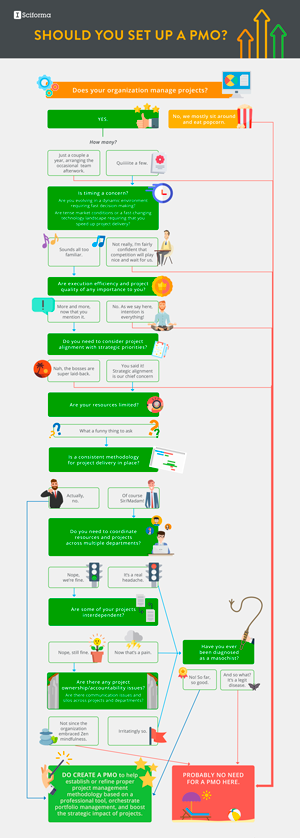If you work in a company that deals with a lot of projects you might have heard of a Project Management Office (PMO). If you’re not sure what it stands for and if you need it, you’ve come to the right place. Read our this article to find out what they are and if you should set one up!
What is a PMO within project management?
If you don’t know, PMO stands for Project Management Office (or Project Management Officer, sometimes even Portfolio Management Office), depending on whether we’re talking about a department or a person. Essentially, it’s the department that deals with Project Management at the Portfolio level. The Project Management Office:
- sets, maintains and ensures standards for project management across the organization
- makes sure launched projects are aligned with the company strategy
- prioritizes projects within a portfolio according to the company’s goals
- ensures projects within a portfolio are under control (within scope, budget and schedule)
- generates and follows up on projects & portfolio reports
- centralizes documentation, references and statistics for everything related to the realization and management of projects…
…among other missions.
Feels like you could benefit from it? Let’s move to the next topic!
Why set up a PMO?
Many reasons really. If you feel overwhelmed and lack visibility on your company’s projects, it could be a good reason. Usually, organizations set up a PMO to :
- make investments profitable and increase project ROI
- standardize project management practices
- get an overview of the portfolio general state of progress
- smooth portfolio management
Do you need a PMO ?
Now, that’s a tricky question! We’ve drawn a little something to help you make your decision. Just follow the guide, and find out if, yes or no, you need to set up a PMO.

THE ANSWER IS YES? See how Exceldor did it and was able to focus on strategy to stay competitive in the market.
THE ANSWER IS NO? You could still increase your project productivity! Check our last article about 6 time-consuming and non-value-added activities that waste your projects.







Camélia Docquin
Camélia is Sciforma’s Global Marketing Director and enjoys learning different perspectives of the current business environment and project management challenges that enterprises and individuals face daily. Main interests include : innovation, digital transformation, and strategy execution.